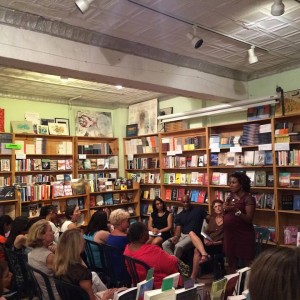
It happened at every book talk. Someone would come up to me – sometimes a person I knew from long ago, often a stranger – to say, “This happened to me or to someone I love.” Readers who heard about the tour but couldn’t make their local event sent me emails or Facebook messages. One woman stopped me after total body conditioning class. We sweat together two or three times a week but barely know each other’s name. “I loved your novel,” she said. “My daughter was raped in college. At the time my husband and I didn’t know what to do. It’s still painful for her, more than 20 years later. Your book was so helpful.”
A central theme of my novel Again and Again is the long-term impact of rape on survivors and those around them, and what it means when young rapists grow up to be powerful men. The book is also about friendship, and love and marriage, about trust and regrets and second chances, and lots of other themes
I rejoiced every time someone said Again and Again was a great read. I loved hearing people say this novel made them laugh. And I adored the fans who asked, “How can we spread the word about your book?”
But most of all, I was heartened by the people who said the story touched their lives, especially young people I met who are fighting to end gender violence and who found my book a useful ally in that fight.
Here are some that especially stand out:
The young woman in DC who helped found the organization Know Your IX and shared her story of being raped at Amherst and being told by an administrator, “Why don’t you take a leave and work at Starbucks for a while? He’ll graduate and then you can come back.” She did just that – until a friend told her there’s a law called Title IX that requires colleges and universities that receive federal funds to take action to stop sexual assault. She went back, filed a lawsuit and became an organizer.
The young college student in New York, standing in the back of a crowded one-room bookstore with no air conditioning, who said, “I want to be that guy who takes on sexist comments, but it’s tough doing it all by yourself.” You bet, I told him. That’s why the responsibility has to be on college administrations to create conversations – and young men like this will quickly find they won’t be acting alone.
The 130 students at Cal State Northridge in LA who packed the room for my book talk and then for a workshop on how to end sexual assault on campus. They were outraged the university was using an online resource instead of interactive discussion to train students – the online tool is a set of videos followed by questions with no right or wrong answers and no evaluation at the end, nothing to tell a student, “You need more work on this.” In chairs or standing or from a seat on the floor, people called out the problem: the fact that more students are expelled for plagiarism than for sexual assault; the fact that many in the room were hearing for the first time that day about counseling, health and other resources the college had for those who’ve been raped. In clusters and as a large group, some aided by sign language interpreters, we talked about the meaning of “consent” and “rape culture” and what the administration should be doing. One woman said if students could be required to take math, they should also be required to take a course on ending rape. She and others decided to form an organization to make that happen.
At most events someone in the audience would ask, “If you care about ending sexual assault, why did you choose a novel and not non-fiction?”
Here’s why: I wanted to raise awareness of those who would never pick up a non-fiction book, people who have no idea what an injury date rape is and how extensive its reach. I wanted them to get to know and care about Liddie Golmboch, the perceptive, funny textile artist and scholarship student from Saukville, Wisconsin and her roommate Deborah Borenstein, whose life is forever changed after she walks in while Liddie is being assaulted — and as a result of caring about them, also care about ending date rape.
And I wanted to say to those who’ve survived this, I see you. You are not alone. Your survival itself is an act of courage. By banding together, power and community are within your reach.
Leave a Reply